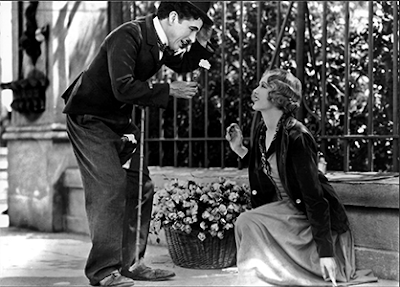
If he had been alive yesterday, Charlie Chaplin would have turned 122 years old.
I usually hate these pointless headlines, invented by the media for no reason other than to fill in a blank on their schedule. However, this is actually quite telling. 122 years is a long time in the entertainment world. When you think that the medium of cinema is only just over 100 years old itself, anything older seems archaic. Even in his forties, Chaplin was considered a bit of a luddite for his insistence on keeping his films silent whilst the rest of Hollywood embraced sound. He resisted for as long as he could, and in so doing, marked himself as a member of the old guard even at a relatively young age.

I fell in love with Chaplin as a child. I was the kid who spent most hot summer days inside, curtains drawn, watching back to back screenings of The Tramp and his flower girl. Like all great friendships, a relationship with Chaplin is one that evolves over the years. The adventures of "The Little Tramp" were some of my favourites from the tender age of 5 or 6. I adored the slapstick comedy, the scenes of drunk characters bumping into lamp-posts or escaping baton-wielding policemen. Show me a child who doesn't find the eating machine scene from Modern Times hilarious and I will declare them certifiably insane.
As I left childhood behind, it was the scenes of love and loss that struck a chord. I couldn't watch the final scene of City Lights without reaching for the Kleenex. There is no sound apart from the swell of sweeping strings; their mouths move, but no words come out. Instead, the emotion comes from the expression of their faces, their eyes, the way they move their hands. There is no script to prop the actors up.

Now when I watch his films, I still love the slapstick and humour, the pathos and heartbreak, but I see something fresh and new. For those who think that silent films are irrelevant and from the dinosaur-age of moviemaking, watch the factory scenes from Modern Times and think again. Chaplin's tramp stands at a production line, working so fast that he doesn't even have time to scratch his nose. If he takes a moment to swat a fly, he has lost the rhythm of his work and must work even harder to make up for lost time. Chaplin seems to be suggesting that in the world of 1936, the pace of technology is moving so fast that we can only ever play catch-up. Now, 75 years later, how many of us struggle to keep up with the constant updates to our iPads, computers and mobile phones? How many times do we take a mini break from Twitter or Facebook, only to then feel like we have a deluge of information to catch up on when we return? Like that production line, it is hard to take a break without feeling like you're falling behind. Chaplin - irrelevant? If anything, as its title suggests, Modern Times is a film for our age too.